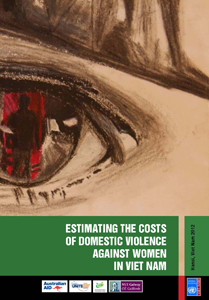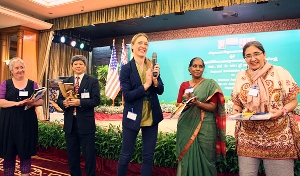In Viet Nam, a new study reveals domestic violence costs 1.78 per cent of GDP
Date:
“He bled me for every dong I earned. ‘How much do you earn today? Give me all or I will beat you to death’,” recalls DTN[i] , a 44-year-old survivor of domestic violence in Viet Nam. “If I had VND 500,000 [Vietnamese dong], for example, I would tell a lie: ‘I just have VND 300,000. I will give it all to you. You should buy rice for our children and shouldn’t beat them. If you beat them, I won’t give you any money’,” she would tell her husband.
 DTN is among more than 1,000 women surveyed for an unprecedented costing study by UN Women Viet Nam published in December 2012. It calculates the enormous economic, psychological and social toll of gender-based violence on survivors, their households and communities as well as for the country as a whole.
DTN is among more than 1,000 women surveyed for an unprecedented costing study by UN Women Viet Nam published in December 2012. It calculates the enormous economic, psychological and social toll of gender-based violence on survivors, their households and communities as well as for the country as a whole.
The study, “Estimating the cost of domestic violence against women in Viet Nam” concludes that both out-of-pocket expenditures and lost earnings represented nearly 1.41 per cent of the Gross Domestic Product (GDP) in Viet Nam in 2010. Moreover, it estimates that women experiencing violence earn 35 per cent less than those not abused, representing another significant drain on the national economy.
As a result, an estimate of overall lost productivity comes to 1.78 per cent of GDP.
The direct costs of incidents of intimate partner violence include the cost of seeking medical care (physical and mental), shelter, mediation, counseling and legal services, judicial resolution, as well as the replacement of property. There are also indirect costs such as income loss due to missed work, loss of reproductive labour, impacts on children’s health and school performance as well as missed school days.
“I decided to divorce as I could not stand more violence at home… I had to take about 10 days off work to go to the court and to see the lawyer. I earn about VND 70,000 – 100,000 per day (USD 3-5),” explains ATL* a 38-year-old survivor of domestic violence. “I presented the court secretary VND 1 million (USD 50) and the lawyer VND 6 million (USD 300). I went to see… the lawyer about 10 times by motorbike taxi. It cost VND 60,000 (2.5 USD) each time. I also lost several hundred thousand dong phoning the lawyer.”

The study surveyed 541 rural women and 512 in urban areas about their experiences with domestic violence and its associated costs. It confirms that violence experienced by women and girls is high and pervasive cutting across all socio-economic groups, education levels and regions. The study cites prevalence figures from the first national study on domestic violence carried out in 2009 under the auspices of the Government of Viet Nam, which found that 34 per cent of women had experienced physical and sexual abuse in their lifetime.
A number of countries –such as Australia, Brazil, Chile, Morocco, Nicaragua, Uganda and the United Kingdom– have recently conducted research or costing studies showing how huge portions of their resources were spent on domestic violence responses, resulting in decreased productivity, increased absenteeism and lower earnings.
Some of these studies also highlight the serious consequences domestic violence has on the well-being and health of victims, their children and friends and family, demonstrating how the intimate relationship between women and men is in fact a public matter with widespread consequences.
“The most savage incident was when I gave birth to the second daughter. He told me that I could give birth only to ducks (daughters). When I was just back from the rice field, he asked me to give money for him to go for drinking. I replied that I did not have enough money for him to go drinking. Then he snatched my hair and beat me with a hammer. My backbone became slack and I couldn’t run away from him. I couldn’t breathe. I thought I had died,” recounts DTX, 46 and still married.
This research underscores the urgent need to comprehensively address domestic violence. It has been provided to the Government and other relevant stakeholders currently advocating for a multi-sectoral coordinated response to be put in place to ensure that domestic violence cases are better addressed and, ultimately, prevented.